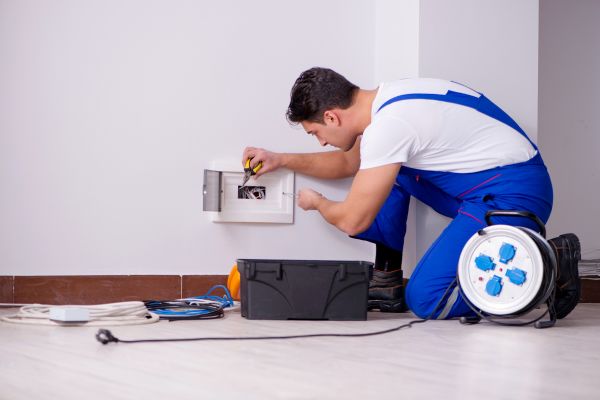Electricity powers nearly every aspect of our daily lives, from lighting our homes to keeping our appliances running smoothly. Yet, despite its importance, many homeowners take their electrical systems for granted until something goes wrong. Understanding common electrical problems in homes not only helps in recognizing potential hazards but also ensures that issues are addressed promptly and safely.
Understanding the Importance of Electrical Safety
Electrical problems in a home are more than just inconveniences. They can pose serious safety risks, including fire hazards and electrical shocks. Recognizing early warning signs can help prevent larger, costlier issues down the line. A proactive approach to maintaining your home’s electrical system is crucial for ensuring a safe living environment.
Flickering or Dimming Lights
One of the most noticeable signs of electrical trouble is flickering or dimming lights. This issue often occurs when there is a poor connection somewhere along the circuit. It might also be a result of an overloaded circuit where too many appliances are drawing power at once. While some may dismiss this as a minor annoyance, it could indicate a more serious wiring problem that requires immediate attention from a qualified electrician.
Frequent Circuit Breaker Trips
Circuit breakers are designed to protect your home by shutting off power when a circuit becomes overloaded or short-circuited. However, if you find that your breakers are tripping frequently, this is a clear sign that something is amiss. This could be due to faulty wiring, overloading of circuits, or even a defective breaker panel. Ignoring this issue may lead to severe damage or electrical fires.
Electrical Outlets That Are Warm or Not Working
Another common electrical problem in homes involves outlets that feel warm to the touch or fail to deliver power. Warm outlets can signal an overloaded circuit or a more dangerous wiring issue behind the walls. Non-functioning outlets, on the other hand, might result from loose wiring or a tripped breaker. In either case, these symptoms should not be overlooked as they may escalate into major electrical hazards.
Buzzing Sounds and Burning Odors
Hearing a buzzing sound from your outlets or switches or noticing a faint burning smell in a room can be alarming. These are often signs of faulty wiring or arcing, which occurs when electricity jumps between loose connections. Such problems can quickly lead to electrical fires if not promptly addressed. Turning off power to the affected area and contacting a licensed electrician is the safest course of action.
Frequent Power Surges
Power surges, though usually lasting only a fraction of a second, can cause significant damage to electronic devices and appliances. They can be triggered by external factors such as lightning strikes or internal issues like faulty wiring or damaged power lines. If your home experiences frequent surges, it may be time to invest in a whole-house surge protector and have an electrician inspect your system for underlying faults.
Light Switches That Don’t Work Properly
Light switches that don’t turn on lights or only work intermittently are another common electrical issue. This can result from a bad connection, outdated wiring, or a faulty switch. Sometimes, this problem arises after a poor DIY installation or renovation. Whatever the cause, a professional should evaluate and correct the wiring to avoid potential hazards.
Overloaded Electrical Systems
Modern homes often demand more power than older electrical systems were designed to handle. Overloaded systems can lead to overheating, tripped breakers, and even electrical fires. Signs of an overloaded system include flickering lights when appliances turn on, frequent breaker trips, and buzzing sounds from the panel. Upgrading your electrical panel to accommodate your home’s energy needs is often the best solution.
Aging Wiring and Outdated Electrical Components
In older homes, outdated wiring such as knob-and-tube or aluminum wiring can pose significant risks. These systems were not designed for the demands of today’s electronics and appliances. Aging wiring can deteriorate, leading to exposed wires, shorts, and fire hazards. If your home is over 40 years old, it’s advisable to have a professional inspection to determine if rewiring is necessary.
The Importance of Professional Electrical Inspections
While some homeowners may be tempted to fix electrical problems on their own, this is not advisable. Electricity is inherently dangerous, and improper repairs can lead to severe injury or further damage. A licensed electrician has the training and expertise to diagnose and resolve issues safely and efficiently. Regular inspections can also help catch potential problems before they escalate, providing peace of mind.
Preventing Electrical Problems in the Future
Preventative measures can go a long way in avoiding electrical problems in homes. Avoid overloading outlets, use surge protectors for sensitive electronics, and schedule regular maintenance for your electrical system. Additionally, be mindful of warning signs such as unusual smells, sounds, or frequent power interruptions, and address them promptly.
Final Thoughts
Common electrical problems in homes can range from minor inconveniences to major safety hazards. By understanding these issues and their warning signs, homeowners can take the necessary steps to keep their electrical systems running smoothly and safely. Regular inspections, timely repairs, and responsible usage are key to maintaining a secure and efficient home environment. When in doubt, always consult a licensed electrician to ensure your family’s safety and your home’s integrity.



